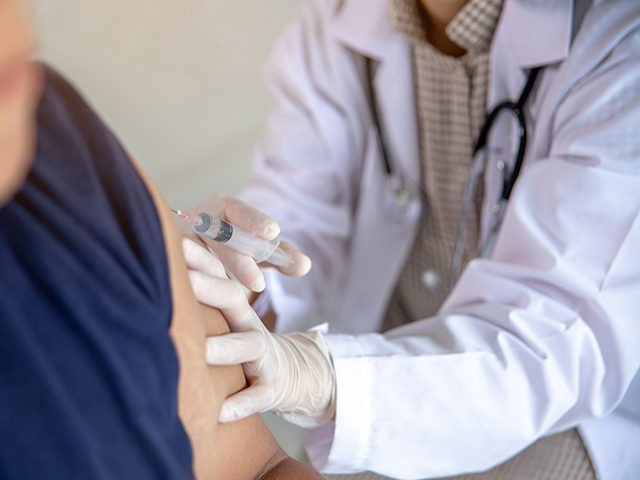Iran’s outgoing President Hassan Rouhani ordered the nation’s Health Ministry to begin plans to buy Chinese coronavirus vaccine candidates from other countries this weekend, raising questions about the progress Iran has made on its alleged indigenous attempt at a vaccine.
The Health Ministry has for months claimed that its scientists are participating in the global race to find inoculation against the Chinese coronavirus, discovered in the central city of Wuhan in late 2019. Outside of the Ministry, the Islamic Revolutionary Guard Corps (IRGC) — a U.S.-designated terrorist organization that operates as a formal wing of the Iranian military — has also claimed to be developing a secret vaccine cure and claimed to have invented a coronavirus “detector.”
As a product of giving the IRGC extensive latitude in controlling the coronavirus fight — resulting in mass funerals attracting thousands of people — and largely denying the severity of the threat, Iran is one of the world’s least adept countries at protecting from the pandemic. The Iranian Islamic regime admits to over 375,000 documented cases of Chinese coronavirus and 21,571 deaths at press time, a number widely disputed due to the fact that the national statistics are far lower than the number of cases documented by local provincial governments added up.
The National Council of Resistance of Iran (NCRI), the nation’s largest dissident organization, has used sources on the ground to document 96,900 deaths in the country due to coronavirus as of Saturday — over four times the number Tehran claims have died.
Iran’s Tasnim News Agency quoted Rouhani on Saturday as urging Health Minister Saeed Namaki to “make all the arrangements necessary for the purchase of vaccines so far developed by other countries.”
“The vaccines should be procured soon and undergo all the tests and trials inside Iran as the country is facing the second wave of the COVID-19 [Chinese coronavirus] crisis,” Tasnim reported Rouhani as saying. “Rouahni further urged people to observe all health protocols and help the country’s health authorities and personnel effectively fight the viral infection.”
Tasnim noted that Russia has the highest-profile vaccine candidates because President Vladimir Putin declared it ready to be used on high-risk patients and well-connected Russians like Putin’s daughter, though the vaccine candidate had not passed phase three trials and international observers expressed close skepticism. It did not mention Rouhani mentioning Russia in particular, though Russia and Iran are close diplomatic allies.
Rouhani’s move to invest in foreign vaccine candidates comes less than a month after him publicly boasting that Iranian-made Chinese coronavirus vaccine candidates were making progress.
“We assure our dear people that the country’s young researchers and specialists are working in knowledge-based companies with high motivation and round-the-clock efforts to produce drugs and vaccines for COVID-19, and the government is providing the necessary and full support to these efforts,” Rouhani assured Iranians in public remarks on August 12.
“In recent months, with the efforts made, good steps have been taken to produce drugs and vaccines for the coronavirus, and this path must continue with strength and speed until the final and definitive result is reached,” Rouhani said. “The outbreak of the coronavirus, along with the problems it created for the people and the medical staff of the country, created an opportunity for scientific research and an extraordinary research effort. Researchers in the country have mobilized with all their might to curb this global pandemic as soon as possible.”
That day, Namaki, the health minister, claimed that Iran had progressed to testing its homemade vaccine candidate on humans.
“Along with other world states, we have started work on [coronavirus] vaccine in our knowledge-based companies, Pasteur Institute of Iran and Razi Institute,” Namaki said, according to the state-run Fars News Agency. “Today, I can say that this multilateral cooperation has made some progress in developing three to four vaccines and these vaccines have passed tests on animals and have entered the human trial phase.”
Namaki’s remarks did not make clear if the candidate progressing to testing was the one the IRGC advertised that it was making in March. That month, during the early stages of the local epidemic in Iran, IRGC Brigadier General Alireza Jalali announced that the IRGC already had a vaccine candidate ready and awaiting approval for clinical trials. The IRGC has not offered any updates or clarity on the status of that medical good at press time, instead debuting more allegedly useful “technology” to fight the pandemic.
In April, Major General Hossein Salami, the head of the IRGC, claimed that the group had developed “a new technology that enables the detection and diagnosis of the new coronavirus within a 100-meter radius in just seconds,” according to PressTV, another Iranian state propaganda outlet. Salami claimed that the device “generates a magnetic field that screens its surroundings, and is fitted with an antenna that points in the direction of infected targets upon detecting them.” It then somehow identifies traces of coronavirus in people.
Observers noted that photos of Salami’s magnetic coronavirus apparatus resemble fraudulent “bomb detectors” that the Iranian regime used in a money-grab scheme in Iraq in 2017.
A week ago, Iran’s agriculture minister claimed that some form of a coronavirus vaccine candidate had reached the first phase of clinical trials but did not specify which. Fars News claimed that Iran had several researchers working on different attempts at vaccines and that officials expect updates on their efficacy in the next few months.
At the time, Fars News reported that Iran would wait for the World Health Organization’s (W.H.O.) approval of the experimental Russian concoction before purchasing any doses.
No nation or pharmaceutical company has developed a vaccine for any known strain of coronavirus.

COMMENTS
Please let us know if you're having issues with commenting.